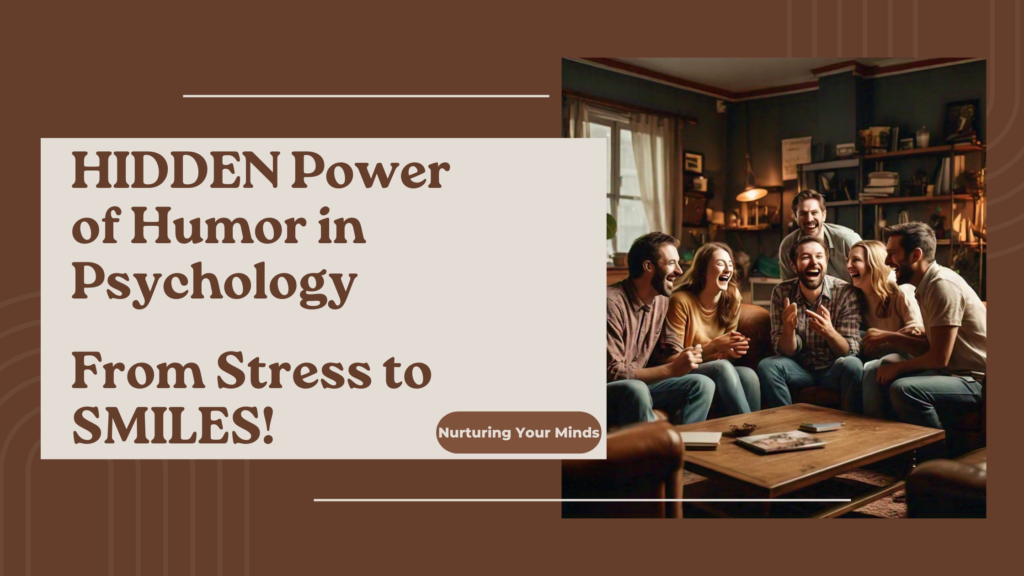Ever wondered why a good laugh feels like a breath of fresh air? In the world of psychology, humor isn’t just about cracking jokes; it’s a powerful tool for healing, connection, and transformation.
Introduction: The Dual Role of Humor in Human Experience
Humor, often considered the spice of life, serves a dual role in human experience. It entertains, amuses, and brings joy, but beneath the surface, humor holds profound psychological significance. It’s more than just a series of jokes or funny anecdotes; it’s a complex cognitive and emotional process that has the potential to influence our mental well-being. But how does humor function in the realm of psychology? How can something as lighthearted as a laugh play a pivotal role in serious mental health practices? This article delves into the psychological aspects of humor, exploring its benefits, the mechanisms behind its therapeutic effects, and its application in psychotherapy.
The Psychology Behind Humor: Cognitive and Emotional Dimensions
Humor is a unique human trait, intertwined with both cognitive and emotional processes. From a psychological perspective, humor involves a set of cognitive skills, including abstract thinking, social intelligence, and the ability to see situations from multiple perspectives.
Cognitive Processes: The Art of Incongruity
At the heart of humor lies the concept of incongruity; a cognitive process where the brain recognizes a mismatch between expectation and reality. This cognitive dissonance often leads to the surprise and delight that we experience as humor. When a punchline takes an unexpected turn, it challenges our mental patterns, forcing us to reconcile the absurdity with our understanding of the world.
For instance, consider the classic joke: “Why don’t scientists trust atoms? Because they make up everything.” The humor here stems from the incongruity between the literal interpretation and the play on words. Our cognitive system revels in resolving this contradiction, leading to a moment of amusement.
Emotional Release: The Catharsis of Laughter
Humor also functions as an emotional release, a concept that Sigmund Freud referred to as “catharsis.” Laughter allows individuals to release pent-up emotions and tension, offering a psychological reset. This emotional release is crucial in dealing with stress, anxiety, and other mental health challenges. The act of laughing reduces the levels of stress hormones like cortisol and adrenaline while boosting endorphins, the body’s natural feel-good chemicals.
Humor as a Coping Mechanism: Building Resilience Through Laughter
Life is filled with challenges, and humor serves as a powerful coping mechanism in the face of adversity. The ability to find humor in difficult situations is a hallmark of resilience, allowing individuals to maintain a positive outlook even during trying times.
Humor in the Face of Trauma
One of the most profound examples of humor as a coping mechanism can be found in those who have experienced trauma. Survivors often use humor as a way to distance themselves from the pain and to regain a sense of control over their narrative. By laughing at the absurdity of life’s hardships, individuals can reframe their experiences, making them less overwhelming.
For example, many veterans who have experienced the horrors of war often share dark, ironic humor among themselves. This shared laughter fosters a sense of camaraderie and helps them process their experiences without becoming overwhelmed by the emotional weight.
Humor in Everyday Stress
On a more everyday level, humor helps people deal with stress at work, in relationships, and in other areas of life. Imagine a situation where a project at work goes terribly wrong. Instead of giving in to frustration or despair, a well-timed joke can shift the atmosphere, allowing everyone to take a step back and approach the problem with a fresh perspective. This isn’t just about making light of serious issues but about using humor to break the tension and create an environment where problem-solving becomes more manageable.
And if you’re the one who is experiencing stress in your daily life, whether it is work related or academic or personal one, and is unable to manage and cope with it, here is my detailed and therapeutic De-Stress Nurturing Program, in order to make you capable of dealing with your stress in a more effective and efficient manner.
The Therapeutic Use of Humor in Psychotherapy
Given its cognitive and emotional benefits, it’s no surprise that humor has found its place in psychotherapy. Known as “humor therapy” or “laugh therapy,” this approach leverages the power of humor to promote psychological well-being.
The Role of Humor in Therapy Sessions
In a therapeutic setting, humor can be a valuable tool for building rapport between the therapist and the client. A well-timed joke or light-hearted comment can break down barriers, making clients feel more comfortable and open. This sense of ease can lead to more productive therapy sessions, where clients are willing to explore difficult emotions and experiences.
Moreover, humor can help clients gain new perspectives on their problems. When a therapist uses humor to reframe a client’s issue, it can shift the client’s mindset, making the problem seem less daunting and more manageable. For example, a therapist might use humor to highlight the irrationality of a client’s negative self-talk, leading to an “aha” moment where the client realizes the absurdity of their thought patterns.
Humor in Cognitive Behavioral Therapy (CBT)
Humor is particularly effective in Cognitive Behavioral Therapy (CBT), where the focus is on changing dysfunctional thought patterns. CBT often involves challenging negative or irrational thoughts, and humor can be an excellent way to do this. By exaggerating a negative thought to the point of absurdity, therapists can help clients see the flaw in their thinking, leading to cognitive restructuring.
For instance, a client who struggles with perfectionism might say, “If I don’t do this perfectly, it’s the end of the world!” A therapist might respond with, “So, if you make a typo in this report, the Earth is going to explode?” This humorous exaggeration helps the client see the irrationality of their thought, making it easier to adopt a more balanced perspective.
Laughter Yoga: A Unique Therapeutic Approach
Laughter Yoga is another innovative therapy that combines humor and physical exercise. Developed by Dr. Madan Kataria in the mid-1990s, Laughter Yoga involves a series of playful exercises designed to stimulate laughter. Unlike traditional yoga, which focuses on physical postures, Laughter Yoga emphasizes the psychological and physiological benefits of laughter.
Participants in Laughter Yoga sessions engage in group laughter, clapping, and breathing exercises, all while maintaining eye contact with others. The idea is that even forced laughter can trigger the same benefits as spontaneous laughter, leading to improved mood, reduced stress, and a sense of social connectedness.
Yoga Laughter Exercise Book can also be beneficial in order to practice laughter yoga in a fun and efficient manner.
Cultural and Social Aspects of Humor: A Universal Language?
Humor is often described as a universal language, but this isn’t entirely accurate. While laughter is a universal human expression, the things we find funny are deeply influenced by culture, social norms, and individual experiences.
Cultural Differences in Humor
What one culture finds hilarious, another might find confusing or even offensive. For example, British humor is known for its dry, often self-deprecating style, while American humor tends to be more direct and exaggerated. These differences are shaped by cultural values, historical context, and societal attitudes.
Understanding these cultural nuances is important in both social interactions and therapeutic settings. A therapist working with clients from diverse backgrounds needs to be aware of these differences to use humor effectively and sensitively.
Humor and Social Connection
Despite cultural differences, humor is a powerful tool for social bonding. Shared laughter creates a sense of connection, fostering empathy and understanding between individuals. In group settings, humor can break the ice, dissolve tension, and bring people together.
This social aspect of humor is particularly important in therapy groups, support groups, and community settings. Laughter can create a sense of unity among group members, helping them feel supported and understood by others who share similar experiences.

The Dark Side of Humor: When Laughter Hurts
While humor has many positive effects, it’s important to recognize that it can also be used in harmful ways. Sarcasm, ridicule, and hostile jokes can damage relationships and harm mental health.
Aggressive and Self-Defeating Humor
Psychologists distinguish between different styles of humor, some of which can be detrimental. Aggressive humor, which includes sarcasm and put-downs, is often used to assert dominance or belittle others. While it might be amusing to some, it can create a toxic environment, leading to feelings of resentment and hostility.
Self-defeating humor, where individuals make jokes at their own expense, can also be harmful. While it might seem like a way to cope with insecurity, it can reinforce negative self-perceptions and contribute to low self-esteem.
Humor as a Defense Mechanism
Humor can also serve as a defense mechanism, allowing individuals to avoid dealing with uncomfortable emotions or situations. For example, someone might use humor to deflect attention from their vulnerabilities or to downplay serious issues. While this might provide temporary relief, it can prevent individuals from addressing the root causes of their problems.
In a therapeutic context, it’s important for therapists to recognize when humor is being used defensively and to gently guide clients toward more constructive ways of coping with their emotions.
The Future of Humor in Psychology: Expanding Horizons
As our understanding of psychology continues to evolve, so too does our appreciation for the role of humor in mental health. Researchers are exploring new ways to incorporate humor into therapy, education, and everyday life, recognizing its potential to enhance well-being on multiple levels.
Humor in Positive Psychology
Positive psychology, a field focused on enhancing well-being and promoting human flourishing, has embraced humor as a key component of a fulfilling life. Researchers in this field are studying how humor contributes to happiness, resilience, and overall life satisfaction. By understanding the mechanisms behind humor’s positive effects, psychologists can develop new interventions to help people lead happier, more meaningful lives.
Technology and Humor: A New Frontier
With the rise of digital technology, humor has found new platforms for expression. Social media, memes, and online communities have transformed the way we share and experience laughter, allowing jokes and funny content to spread rapidly across the globe, connecting people in real-time and creating a shared sense of humor that transcends geographic and cultural boundaries.
Practical Tips for Incorporating Humor into Your Life
Given the numerous benefits of humor, it’s worth exploring ways to bring more laughter into your daily life. Here are some practical tips to get you started:
1. Seek out humor in everyday situations:
Look for the funny side of life, whether it’s a quirky observation, a playful interaction, or a humorous mishap. Train yourself to find joy in the little moments.
2. Spend time with funny people:
Surround yourself with friends and family who have a good sense of humor. Their positive energy and laughter will be contagious.
3. Engage with humorous media:
Watch comedies, read funny books, or listen to humorous podcasts. Exposure to different forms of humor can keep your spirits high and your mind engaged.
4. Practice self-deprecating humor:
Don’t be afraid to laugh at yourself. Embracing your imperfections with a sense of humor can build resilience and self-acceptance.
5. Use humor to diffuse tension:
In stressful situations, a well-placed joke or light-hearted comment can break the ice and ease tension. Just be mindful of the context and the feelings of others.
6. Incorporate humor into your work:
Whether you’re giving a presentation, leading a meeting, or writing an email, a touch of humor can make your communication more engaging and memorable.
7. Try laughter yoga:
This unique practice combines laughter exercises with deep breathing techniques, promoting relaxation and a sense of well-being. It might feel silly at first, but it’s an effective way to boost your mood.
Conclusion: Embrace the Power of Laughter
In the grand tapestry of human experience, humor is a vibrant thread that weaves joy, resilience, and connection into our lives. By understanding the psychology behind humor and harnessing its benefits, we can cultivate a more positive and fulfilling existence. So, the next time you find yourself in a challenging situation, remember to look for the humor in it. After all, as Charlie Chaplin once said, “A day without laughter is a day wasted.”
Humor is not just a fleeting escape from reality; it’s a profound tool for navigating the complexities of life. Embrace it, share it, and let it guide you toward a healthier, happier you.



